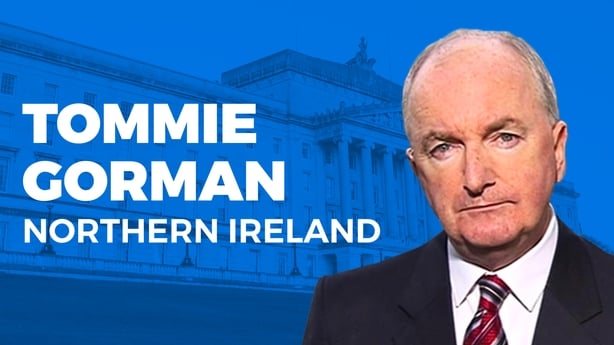Northern Ireland Secretary James Brokenshire has said he is considering new laws to dock or stop salaries to MLAs as the deadlock at Stormont continues.
Mr Brokenshire has said the chances of political parties in the north restoring a power-sharing agreement were "not positive".
He said that talks have stalled in the last few days, with the deadline for an executive to be formed is to pass the week beginning 6 November.
Mr Brokenshire said Britain would be forced to impose a budget on Northern Ireland if no deal was reached by that time.
He told a parliamentary committee: "If I had given evidence to this committee last week I might have indicated some momentum, more progress.
"That progress stalled at the end of last week.
"Unless there is a renewed spirit of compromise then the outlook for imminent resolution is not positive. Time is running out.
"We are on glide path to greater and greater UK government intervention."
"I think, to be honest, there is consensus even among the politicians in Northern Ireland, the MLAs themselves, that this can't carry on.
"They acknowledge that for them to be paid at the rate that they are, not being able to do the job that they do, is simply unsustainable."
An MLA is on £49,500 a year after they got a £500 pay rise in April - three months after the Stormont Executive collapsed.
That is almost double the official figure given for an average wage in Northern Ireland.
Mr Brokenshire said that in order for politicians' pay to be stopped, a law would need to be passed at Westminster.
Meanwhile a spokesperson for the British Prime Minister has said Theresa May would meet the former US President Bill Clinton tomorrow to discuss the situation in Northern Ireland.
Earlier this week, Mr Clinton met the leaders of the DUP and Sinn Féin.
Northern Ireland's powersharing Executive collapsed in January, when Sinn Féin pulled out of government with their DUP counterparts in protest at how the latter had handled allegations of mismanaging a renewable energy scheme.
Since then, a number of talks processes have been entered into by the parties aimed at reaching a deal to return to government, but without success.
Sinn Féin leader in Northern Ireland Michelle O'Neill said her party would not return to powersharing without an agreed Irish Language Act.
DUP leader Arlene Foster rejected the proposal, instead suggesting a "cross community" bill with provisions for Irish and Ulster Scots.
However, Sinn Féin said the party would only agree to standalone Irish language legislation.

Sinn Féin and the DUP have been trying to resolve the issues that caused their row ten months ago and collapsed power-sharing.
In their private meetings, with the British and Irish governments in the wings, they were making progress.
But the two sides became cautious towards last weekend.
It was a case of nerves at wedding planning stage rather than a row at the altar rails.
Today the Northern Ireland Secretary set a real deadline.
James Brokenshire said the British government will introduce a budget for Northern Ireland if there is no Stormont administration by the first week in November.
Sinn Féin's Pat Sheehan said at Stormont that there are seven to ten days to see if an agreement can be reached.
SDLP leader Colum Eastwood said it was clear that Northern Ireland was close to direct rule.
He said this would be damaging as the Conservative party had shown no interest in Ireland.
Speaking on RTÉ's News at One, he said: "What we have now is no government and we're very close to having a situation of direct rule.
"That is direct rule by the British Tory party, who have clearly shown they have no interest in Ireland and they're hurtling towards a Brexit that will be very, very damaging to the people of Ireland as a whole."
He said the DUP and Sinn Féin have locked everyone else out of negotiations.
Mr Eastwood called on both parties to put their positions on the table and show how far they have come in talks.
He added that both sides have had months to negotiate and if they were keen to do a deal, it would have been completed by now.

